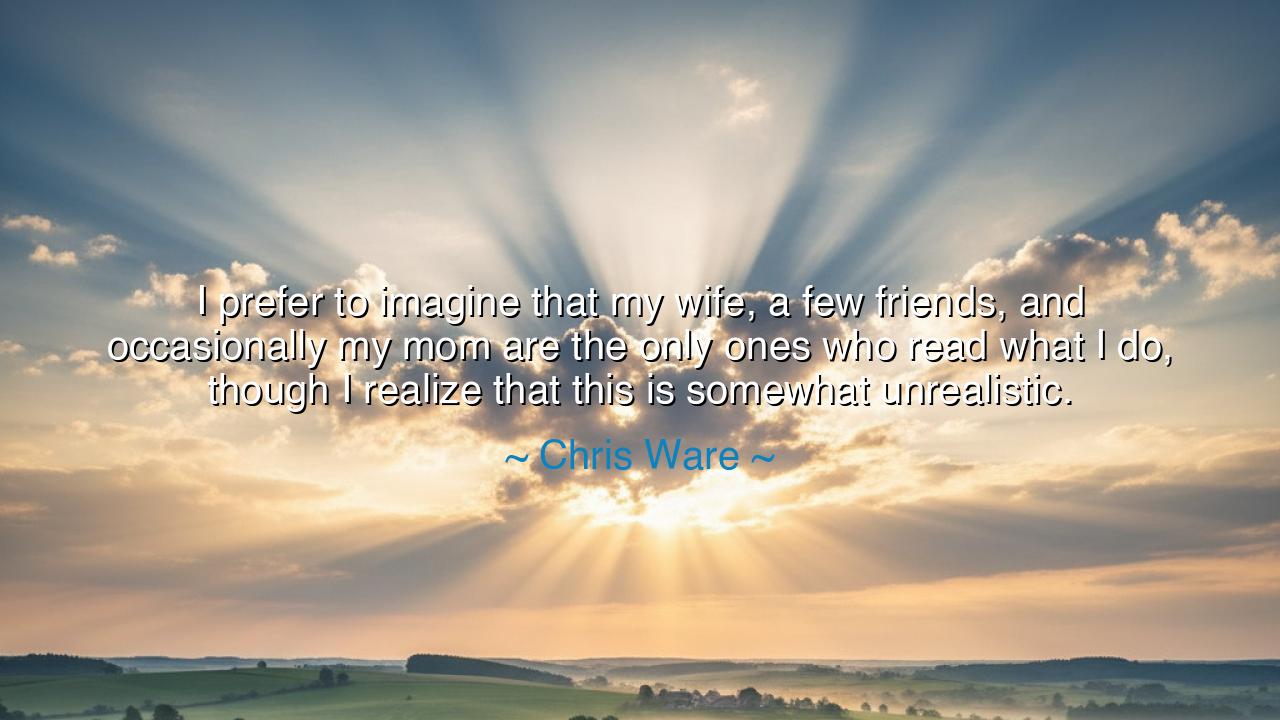
I prefer to imagine that my wife, a few friends, and occasionally
I prefer to imagine that my wife, a few friends, and occasionally my mom are the only ones who read what I do, though I realize that this is somewhat unrealistic.






Hear, O seekers of truth, the humble confession of Chris Ware, master of pen and paper, who said: “I prefer to imagine that my wife, a few friends, and occasionally my mom are the only ones who read what I do, though I realize that this is somewhat unrealistic.” At first, his words sound almost playful, like a man speaking of modest dreams. Yet behind them is a deep well of wisdom, for they reveal the longing of the artist’s heart: to create not for faceless crowds, but for those who truly know and love him.
Mark the first mystery: I prefer to imagine. In these words lies the shield of the creator. To imagine is to protect the self from the unbearable weight of public judgment. For when one writes, paints, or sings, the soul lays itself bare upon the page, and the gaze of thousands can feel like fire upon tender skin. To think instead of only a wife, a few friends, and a beloved mother, is to soften the fear of exposure, and to keep the act of creation intimate and true.
Behold the sacred circle: wife, friends, mother. These are not strangers, but anchors of love, people whose eyes see not just the work, but the heart behind it. Their judgment is not a blade but a balm, for it comes not from envy or criticism, but from recognition. Thus the artist turns his face from the vast multitude and imagines only this small company, as though by doing so he can continue to create without becoming enslaved to the opinions of the masses.
Yet he admits with quiet clarity: this is somewhat unrealistic. And so the eternal conflict is revealed. Every work that leaves the hand of its maker takes on a life of its own, escaping the chamber of intimacy and entering the vast wilderness of the world. The author cannot control who sees it, nor what they think. The tale of every artist since the dawn of time is this: the struggle to remain pure in purpose even as the crowd gathers, shouting both praise and condemnation.
Think upon the story of the great poet Emily Dickinson. She wrote not for the world, but for herself, and perhaps for a sister or a friend. She kept her verses hidden in drawers, bound in little bundles, untroubled by fame. Only after her death did the world discover the vast cathedral of her soul. In this, she lived the dream Chris Ware describes: writing as though only a few trusted hearts would ever hear her voice. Yet history carried her whispers into eternity, beyond even her imagination.
The lesson is this: when you labor in your craft, do not weigh your soul with the burden of the world’s eyes. Create as if you are speaking to those who love you most, and in so doing, your work will shine with sincerity. If the world must see it, let that be their fortune, but not your aim. For the truest art is born not of the hunger for applause, but of the quiet desire to share one’s inner light with those who will hold it gently.
So I counsel you, reader: when you write, paint, build, or dream, imagine first the face of one you love. Let your words be for them, your work a gift laid at their feet. In this way, your labor will remain free from the chains of vanity, and your spirit unshaken by the noise of the crowd. And if the world should one day honor you, receive it with humility—but never forget the small circle for whom your heart first spoke. Thus shall your work remain both pure and eternal.






AAdministratorAdministrator
Welcome, honored guests. Please leave a comment, we will respond soon